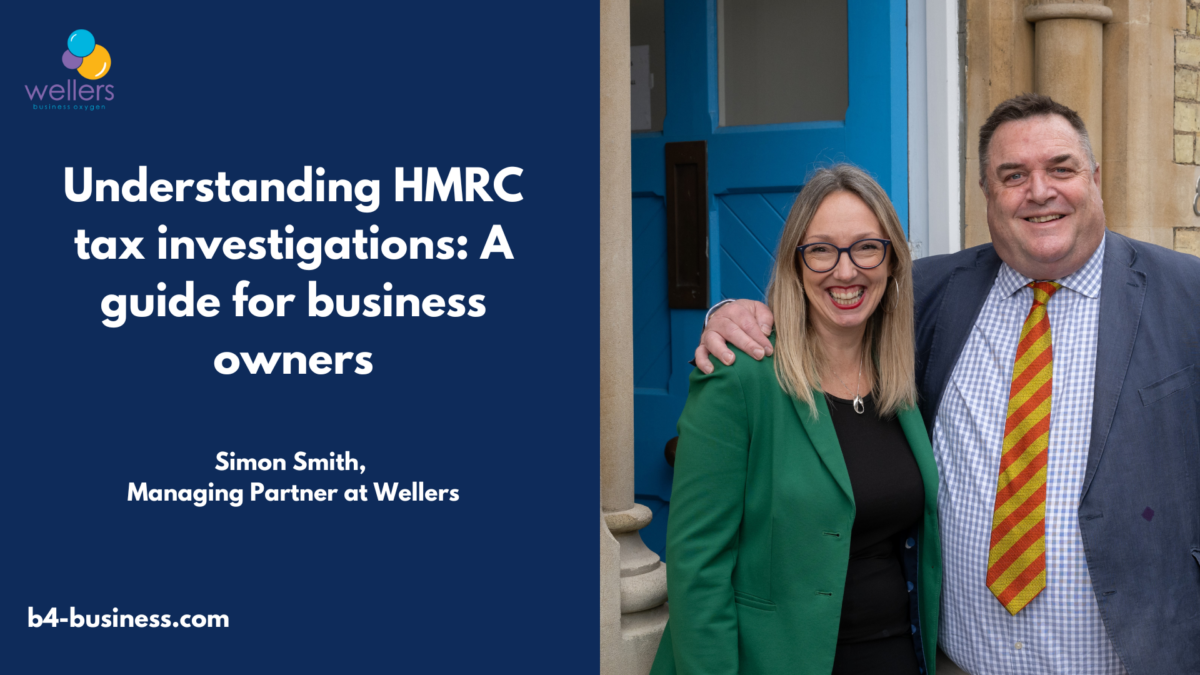
Understanding HMRC tax investigations: A guide for business owners
Simon Smith, Managing Partner at Wellers, discusses what business owners need to know about tax investigations, including whether you could be a target.
The UK’s tax authority (HMRC) is responsible for ensuring tax payments are made and enforcing tax laws. This encompasses direct taxes, such as Income Tax, Corporation Tax, Capital Gains Tax (CGT), and Inheritance Tax, as well as indirect taxes, which include Value Added Tax (VAT) and council tax, amongst others.
Many business owners are accustomed to the annual task of filing their accounts and tax returns. However, some may unexpectedly find themselves under scrutiny from HMRC’s taskforces which can be triggered by various factors, even those beyond the business owner’s control.
- Errors or omissions in tax returns
The biggest red flag for HMRC and often the trigger of a tax investigation is incorrect calculations when filing tax returns. They don’t have to be big errors either, it could be something as simple as a decimal point being out of place.
Discrepancies in reporting income are another aspect that can cause a tax investigation. These can be caused by accidentally misclassifying income, failing to declare certain types of income, or claiming ineligible expenses. These are all easy mistakes to make but can cause a wider issue with HMRC.
The biggest reason simple errors like this can creep in when filing a tax return is not being sufficiently prepared. Too many people leave it until the last moment to complete their tax returns which often leads to them rushing to get it done in time. With so much of the process being manual, it can be easy fto commit errors. However, HMRC doesn’t see it as human error, and this is when a tax investigation could be triggered. This is why working with an accountant is important as it’s their job to keep you on track and ensure everything is in order.
2. Suspected fraud or evasion
Suspected fraud, or tax evasion, is the most serious reason for HMRC to investigate a person’s tax affairs. Failing to declare all income or diverting funds fall under this umbrella. This includes the use of offshore accounts, undocumented cash transactions, or other methods to hide income from HMRC.
Secondary to this is making false or exaggerated expense claims. This could be anything from claiming personal expenses as business expenses to inflating the cost of various purchases.
3. Risk assessment and intelligence
However, it’s worth noting that tax investigations aren’t just triggered by discrepancies, mistakes, or suspicious activity. Certain industries, including construction and hospitality, are seen as higher risk by HMRC and so are often subject to more scrutiny. For example, the construction industry is often associated with ‘cash in hand’ payments which can lead to undeclared income.
Over the years, HMRC has built up sophisticated data mining processes to identify patterns and anomalies that could indicate non-compliance. This includes comparing a business’s performance to industry benchmarks and analysing trends in financial data.
HMRC also takes anonymous tips from employees, suppliers, or customers which can initiate an investigation.
4. Random checks and audits
Being responsible for collecting taxes and ensuring compliance, HMRC also has the right to conduct random checks to ensure tax laws are enforced. This involves selecting businesses based on various factors, such as size, industry, or geographic location.
Audits can also be focused on specific sectors or industries to address emerging risks. For example, the gig economy has been a recent target to ensure that workers are correctly classified as employees, or self-employed, as this impact on which exact taxes are owed.
5. Changes in business circumstances
Whilst rapid growth can be great for the balance sheet it can attract attention of HMRC. This is particularly true if it isn’t accompanied by corresponding tax returns. A dramatic increase in revenue or profits may trigger a tax investigation to ensure that the business is paying the correct amount of tax – almost like emergency tax works in the PAYE system.
Conversely, unexpected business closures or liquidations can trigger interest from HMRC as it will want to assess tax liabilities to ensure that all outstanding taxes are paid before the business is dissolved.
Final thoughts
There are several reasons why HMRC might investigate your business’ taxes, many of which are outside of your control. What is crucial is that if you find yourself under investigation by HMRC, that you take immediate action and seek professional advice.
Tax investigations can be long and complicated affairs, so having someone on board who understands your rights, can gather evidence, and navigate the process on your behalf will be invaluable. Remember, early engagement with HMRC can often lead to more favourable outcomes.
Find out how Wellers can help you prepare for a tax investigation.
More in Finance

How B4 members could benefit from Salary Exchange before National Insurance...
Sarah Herd, Head of Workplace, Wren Sterling

UK Bond Market: What You Need to Know
The UK government bond market is once again making headlines as yields on longer-term debt surge to levels not seen in decades. This latest development has raised concerns among investors and policymakers, presenting significant challenges for the government’s fiscal plans.

B4 Finance Ecosystem: The specific opportunities and challenges that women encounter...
Charles Stanley are committed to fostering a proactive approach to investing and their goal is to empower women to make well-informed financial decisions and capitalise on potential growth opportunities. They also strive to support women in crafting their unique financial narratives, enhancing their knowledge, and understanding of investment strategies, and building a robust and influential female network.
From this author

Budget 2024 review: A bitter pill for SMEs?
Tom Biggs, Partner at Wellers, the Oxford-based small business accountants, discusses the latest Budget and the impact it will have on SMEs.

Evolution and Growth for Oxfordshire’s Wellers
Simon Smith takes the helm as Managing Partner

The Spring Budget: What you need to know
Tom Biggs, Associate at Oxford-based accountancy firm Wellers, provides the key highlights from Chancellor Jeremy Hunt’s recent Budget statement.


